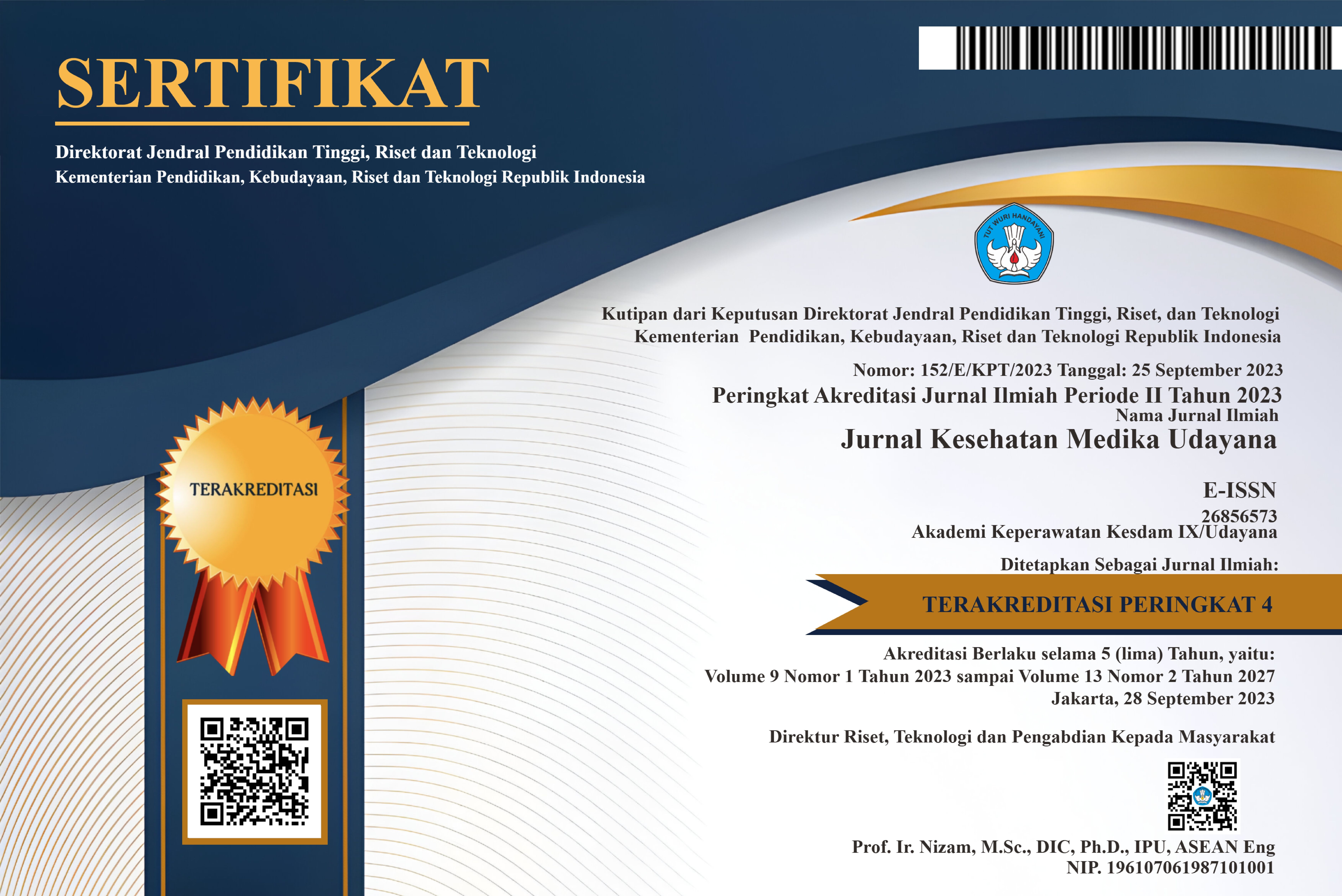HUBUNGAN PENGGUNAAN KONTRASEPSI HORMONAL DENGAN KEJADIAN HIPERTENSI PADA WANITA USIA REPRODUKTIF (15-49 TAHUN) DI WILAYAH KERJA PUSKESMAS TELADAN KOTA MEDAN TAHUN 2019
DOI:
https://doi.org/10.47859/jmu.v6i1.159Keywords:
Hormonal contraception, Hypertension, Women at Reproductive ageAbstract
Background: The prevalence of hypertension in Indonesia continues to increase, especially in women. The incidence rate reached 28.8% higher than the incidence of hypertension in men which is 22.8%. There are factors that make women more at risk of hypertension than men. Namely the use of hormonal contraception in women whose users reach 47.54%. Purpose: to analysis Correlational hormonal contraceptive use and hypertension. Methods: This research is an observational survey research, case-control design. Held in the Work Area of the Medan City Primary Health Center. Conducted from March-June 2019. The population were all women of productive age (15-49 years) totaling 572 people. The size of the case sample was 35 people and 35 controls. Case samples were taken by means of consecutive sampling, control samples were taken by convenient sampling. Data analysis was performed univariately and bivariately using the Chi Square statistical test (?2) with a significance level of 0.05. Results: In the hypertension group, 77.1% used hormonal contraception and 22.9% did not use hormonal contraception. Whereas in the non hypertensive group 62.9% did not use hormonal contraception only 37.1% used hormonal contraception. There is a relationship between hormonal contraceptive use and hypertension in women of reproductive age. A value (OR = 5.7; 95% CI 2,008-16,244) means that women of reproductive age are at risk of experiencing hypertension 5.7 times greater if women of reproductive age use hormonal contraception than those who do not use hormonal contraception. Conclusion: Women of reproductive age are at risk of developing hypertension when using hormonal contraception. Therefore, it is recommended that women of reproductive age prefer non-hormonal contraception or natural contraception. If using hormonal contraception to keep monitoring blood pressure regularly at least 3 months after using hormonal contraception and immediately stop using hormonal contraception if there is a hypertension
Keyword: Hormonal contraception; Hypertension; Women at Reproductive age
References
Hartanto, H. (2012). Keluarga Berencana dan Kontrasepsi. Jakarta: Pustaka Sinar Harapan.
Isfandri, S. (2015). Penggunaan Kontrasepsi Hormonal dan distress Emosional Sebagai Kontributor Hipertensi Perempuan Indonesia: Tinjauan Perspektif Gender. Bal. Peneliti. Kesehatan, 43 (1)
Kemenkes RI. (2013). Infodatin Hipertensi. Jakarta: Kemenkes
Kemenkes RI. (2013). Laporan Nasional Riset Kesehatan Dasar (RISKESDAS) Tahun 2013. Jakarta
Kemenkes RI. (2015). Profil Kesehatan Indonesia Tahun 2014. Jakarta
Lemeshow, et al. (1997). Besar Sampel dalam Penelitian. Yogyakarta: Gajah Mada University Press.
Lestari, P.I.; Wagiyo, Elisa.(2013). Hubungan Antara Lama Penggunaan Metode Kontrasepsi Hormonal dengan Kejadian Hipertensi. Skripsi. Program Studi S1 Keperawatan STIKes Telogorejo Semarang
Manuaba, I.G.B.(2012). Memahami Kesehatan Reproduksi Remaja. Jakarta: EGC
Mashitah, S.I dan Romdoni, R. (2015). Hipertensi pada Wanita dan Kehamilan. Surabaya: Badan Penerbit dan Percetakan UNAIR.
Moser, A.K.; Agrawal, S.; Smith, G.D.; Ebrahim, S. (2014). Socio-Demographic Inequalities in the Prevelance, Diagnosis and Management of Hypertension in India: Analysis of Nationally-Representative Survey Data. PLOS ONE. Published online: January 2014
Murayama, M.; Matsunaga, A.; Tangbanleukal, L.; Tantawiwat, S.; Ohtsuka, R., (2013). Effects of Oral Contraceptive use on body mass index and blood pressure among female villagers in North-East Thailand. Cambridge University Press Printed in the United Kingdom. Published online: April 2013
Nojomi, M.; Morrovatdar, N.; Davoudi, F.; Hosseini, S. (2013). Contraceptive use by Iranian women with hypertension, diabetes or obesity. Eastern Mediterranean Health Journal. Published online: 17 Mei 2013
Olatunji L.A dan Saldove A.O. (2012). Effects of Oral Contraceptive use on body mass index and blood pressure among female villagers in North-East Thailand. Cambridge University Press Printed in the United Kingdom. Published online: April 2012
Pangaribuan, L dan Lolong, B.D. (2015). Hubungan Penggunaan Kontrasepsi Pil Dengan Kejadian Hipertensi pada wanita usia 15-49 tahun di Indonesia tahun 2013 (Analisis Data Riskesdas 2013). Published online: 3 Juni 2015
Pikir. S.B.; Aminuddin, M.; Subagjo, A.; Dharmadjati, B.B.; Suryawan, I.G.R.; Eko, J.N.P. (2015). Hipertensi Manajemen Komprehensif. Surabaya: Badan Penerbit dan Percetakan UNAIR.
Rotermann, A.; Bouanani, N.E.; Mekhfi, H. (2015). Contraceptive use by Canada Women with Hypertension, Diabetes or Obesity. Eastern Mediterranean Health Journal. Published online: 17 Mei 2015
Saifuddin, A.B. (2006). Pelayanan Kesehatan Maternal dan Neonatal. Jakarta: Yayasan Bina Pustaka Sarwono Prawirorahardjo.
White, K.; Potter, J.E.; Hopkins, K.; Amastae, J.; Grossman, D. (2013). Hypertension among oral contraceptive users in El Paso, Texas. Mehary Medical Collage Journal of Health Care for the Poor and Underserved. Published Online: 2013







